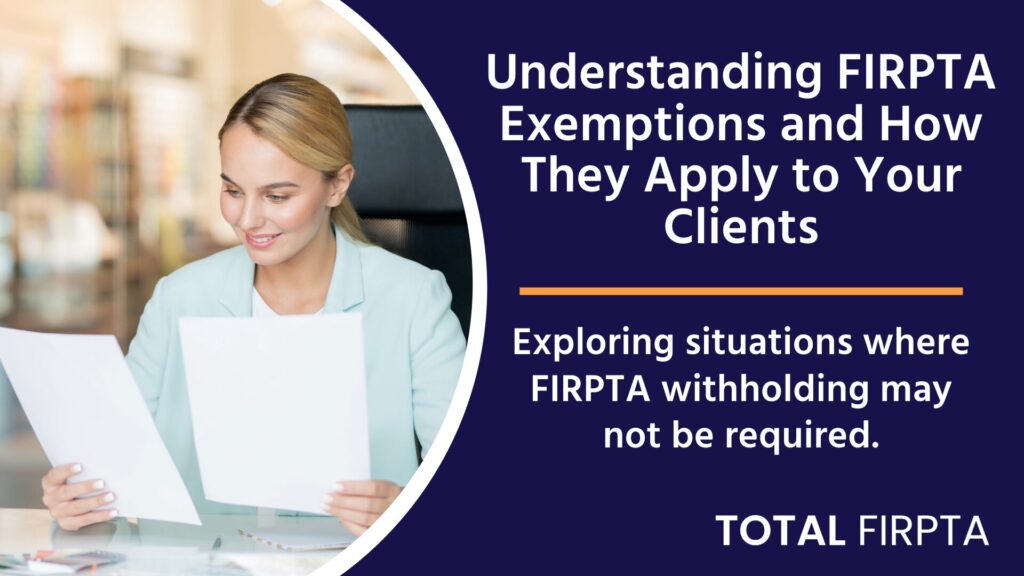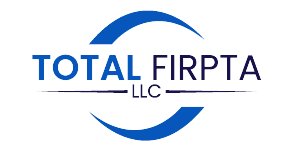
EXPLORING SITUATIONS WHERE FIRPTA WITHHOLDING MAY NOT BE REQUIRED.
Navigating the Foreign Investment in Real Property Tax Act (FIRPTA) can be challenging, but understanding its exemptions is essential for real estate professionals and their clients. While FIRPTA typically requires buyers to withhold a portion of the sale proceeds when purchasing U.S. real property from a foreign seller, there are several situations where withholding may not be necessary. This article focuses on the most common exemptions and how they apply to your clients.
1. SELLER CERTIFICATION OF NON-FOREIGN STATUS
One of the most straightforward exemptions occurs when the seller certifies, in writing and under penalty of perjury, that they are not a foreign person. This document, known as a Certification of Non-Foreign Status, must include the seller’s name, U.S. taxpayer identification number (TIN), and address. The buyer must retain this certification in their records for at least five years to prove compliance if audited by the IRS.
Why It Matters:
This exemption simplifies the transaction process and alleviates the need for withholding, as the buyer has documented evidence that FIRPTA does not apply.
2. BUYER'S PERSONAL USE EXEMPTION
FIRPTA withholding may also be waived if the buyer plans to use the property as a personal residence and the purchase price is $300,000 or less. For this exemption to apply, the buyer or their immediate family members must intend to occupy the property for at least 50% of the total occupied days during each of the first two years after the purchase.
Key Points to Know:
✔️The exemption does not apply to buyers who intend to rent out the property or use it as an investment.
✔️The buyer must be a natural person to use this exemption, not a trust or entity.
✔️Proper documentation of the buyer’s intent is crucial to avoid potential disputes.
3. WITHHOLDING CERTIFICATES
A withholding certificate issued by the IRS can reduce or eliminate the required withholding under FIRPTA. These certificates are granted when it is determined that the seller’s tax liability is less than the standard withholding amount. Sellers or their representatives must apply for this certificate on or before the date of transfer.
How It Benefits Your Clients:
Despite the IRS facing longer-than-usual processing times, withholding certificates offer a customized solution for FIRPTA compliance, ensuring that sellers avoid overpaying taxes while still fulfilling their legal obligations.
4. NON-RECOGNITION OF GAIN CERTIFICATIONS
In certain transactions, the seller may not recognize a taxable gain, such as in a 1031 exchange where the proceeds are reinvested into like-kind property. In these cases, FIRPTA withholding may be avoided if the seller meets certain criteria and provides proper certification to the buyer.
Important Considerations:
✔️Not all 1031 exchanges qualify for this exemption, so a thorough assessment and proper consultation are essential.
✔️Buyers should ensure they understand the certification requirements and deadlines to avoid potential IRS penalties.
FINAL THOUGHTS
Understanding and leveraging FIRPTA exemptions can save time, money, and stress for all parties involved in a real estate transaction. By focusing on these commonly encountered situations, you can help your clients confidently navigate FIRPTA requirements. For more information or assistance with FIRPTA compliance, contact Total FIRPTA LLC for expert advice.
Stay informed and proactive to provide exceptional service to your clients!
